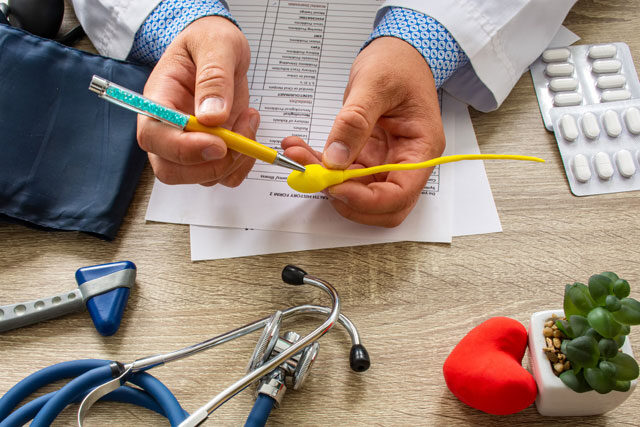Is it said that an average woman has a menstrual cycle of 28 days with a normal error of 1-3 days. For example, one month it is 28 days and the next month the bleeding starts a day or two later making it 30 days. But women’s periods are far more individual than that. Irregular periods do not necessarily need immediate treatment but they surely make some things harder, and ovulation tracking when trying to conceive is one of them.-
What is an irregular period?
The American Academy of Family Physicians (AAFP) claims that 9% to 14% of women have irregular periods between their first and last bleedings. According to the American College of Obstetricians and Gynecologists, a woman’s periods are to be considered irregular, when they happen at unusual intervals (less than 21 days or more than 45), those intervals are inconsistent, or both.
Ovulation Tracking Methods
If the ovaries are healthy and keep functioning as they should, ovulation still happens and the person can still get pregnant. Usually, women track their cycle to predict ovulation, but due to the inconsistency of irregular periods, the calendar method cannot be effective enough to track it.
OPKs
Ovulation prediction kits (OPKs) are used and work similarly to a pregnancy test, but instead of human chorionic gonadotropin (hCG), they detect a level of luteinizing hormone (LH). It goes up a before the egg release, and these tests are 99% right, so, when having a positive result, you can suggest that your body will ovulate a day or two later. However, they will not give you the exact date of ovulation, do not guarantee that it will happen, and work poorly for persons with PCOS.
BBT
The BBT is an abbreviation for basal body temperature which is your lowest body temperature in a 24-hour period. Basically, it is the temperature your body has when it does nothing but rest. It tends to increase during ovulation, so it will be higher after it. This method also has a couple of flaws. Firstly, you need to check your BBT and write it down first thing in the morning, every day, before getting out of bed. It is not always convenient. Secondly, you will be able to see some pattern, if any, only after a while of charting, which takes a lot of patience.
Changes in Cervical Mucus
You can check your vaginal discharge for changes because it reflects to some extent the stage of your cycle. The closer you are to ovulation, the more thin, clear, and watery will it be, gaining some resemblance with egg whites. For your body, it is done to ease the movement of the sperm and to create a more positive medium for it; for you, it can be a method to guess your fertility window.
Irregular Periods Causes
Irregular periods are usually connected to some health issues. They may not need urgent medical interference but it is beneficial to know the reason why you have them, watch them closely with the help of our family medicine professional, and know your options regarding them. Below we listed some most common causes of irregular periods.
Polycystic ovarian syndrome (PCOS)
PCOS affects up to 10% percent of women, according to studies. Caused by a hormonal imbalance, it results in the formation of tiny cysts in the ovaries. They are usually painless and hard to detect especially without regular check-ups which include ultrasound and blood tests.
PCOS affects the way the ovaries work which may manifest as issues with ovulation and the absence of it. It can also complicate pregnancy, which is why it is best to work out a detailed plan with your doctor if you have this diagnosis.
Uterine fibroids
Uterine fibroids can be also called myomas or leiomyomas. They consist of the tissue grown in the uterus during the childbearing years and rarely affect pregnancy. They can, however, affect periods, causing heavier bleeding, more acute pain, or irregularity.
Pelvic inflammatory disease (PID)
PID is usually a complication of an untreated sexually transmitted infection, like chlamydia or gonorrhea, which has spread to affect the uterus, fallopian tubes, and ovaries. The symptoms of pelvic inflammatory disease are:
- fever;
- lower abdominal pain;
- unusual vaginal discharge with an unpleasant smell;
- pain and/or bleeding during the intercourse;
- burning sensation during urination;
- bleeding between periods.
For sexually active persons that experience even one of these symptoms, it is recommended to contact their doctor immediately to get tested and receive a treatment plan.
Thyroid Imbalance
The thyroid is a gland located in your neck which controls many metabolic processes in your body, including hormonal balance, and, as such, it also impacts menstruation and ovulation. Any abnormality of its work can cause a wide variety of consequences, such as weight changes, mood changes, and periods irregularity are among them.
Hyperprolactinemia
Hyperprolactinemia is a condition when the body has an elevated level of prolactin–the hormone that controls breast milk production–while the patient is not pregnant or breastfeeding. It can cause periods irregularity which does not affect your ability to get impregnated but can also prevent ovulation which makes conception impossible.
Weight problems
In 2018, the BioMed Central Women’s Health journal has published a study that showed that menstrual abnormalities were at least 1.1 times more common in women with body mass indexes of less than 20 or greater than 25 than in those with BMIs of 20 to 25.
The reason is a chain reaction that is started in the organism by overweight or underweight and eventually affects the hormonal balance.
Get pregnant with irregular periods
The common question is about the possibility to get pregnant when you have irregular periods. The answer is yes, you can absolutely get pregnant while you ovulate. If the reason for your menstruation irregularity is not likely to create complications during pregnancy, the only difficulty for you will be to track ovulation and determine your fertility window.
Track Ovulation
As the calendar method will be of little to no use with irregular periods, and other methods have their flaws, the best you can do, is to combine several of them and compare the results. You may want to ask for a consult and guidance from the reproductive medicine specialist.
Healthy lifestyle
Lifestyle changes can make a great deal in the task of improving your hormonal balance and overall health. Try to stop smoking and consuming caffeine, alcohol, and fast food; ensure that you get enough of:
- good night’s sleep (8–9 every night);
- balanced diet rich in vitamins, minerals, and fiber;
- physical activity;
- hydration.
Sex
Taking into account that you do not know precisely your ovulation date, it is recommended to have more sex. Remember that sperm can live up to 3 days, so with frequent intercourse, you increase your chances of conception.
Stress and anxiety
Frequent stresses and mental health issues, such as anxiety, change your hormonal balance, increasing the production of the so-called stress hormone–cortisol. It may cause delayed, light, irregular periods, and even amenorrhea–the absence of them.
Summary
Irregular periods do not mean that there is immediate danger to your health and ability to bear a child. As long as you ovulate, and the reason for your cycle to be inconsistent does not promise serious complications during pregnancy, you can successfully try for a child. Tracking your ovulation may be a bit harder but by cross-referencing the results of several tracking methods, a healthy lifestyle, and the support of your doctor, you can achieve your desired goal.
FAQ
What is an irregular period?
The period is called irregular when it has an unusual interval (less than 21 or more than 45 days), intervals differ every month, or there is a combination of both.
Do irregular periods affect ovulation?
Irregular periods do not affect ovulation as is, but the condition that caused the irregularity, can.
Can you get pregnant with irregular periods?
The person can always get pregnant while their body produces fertile eggs. If there is ovulation, there is also a chance of conception.




